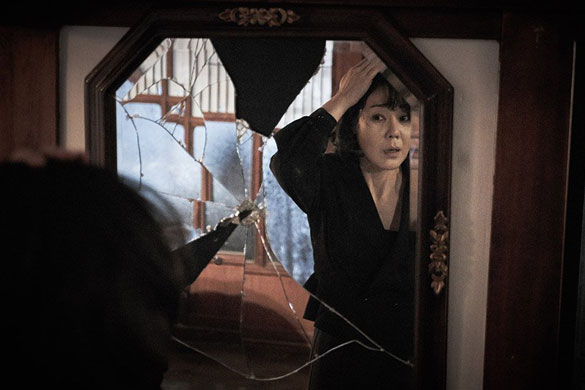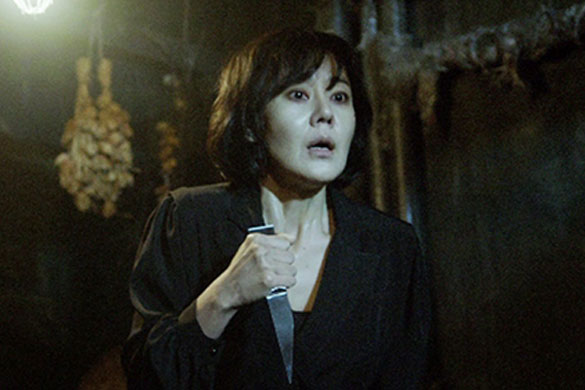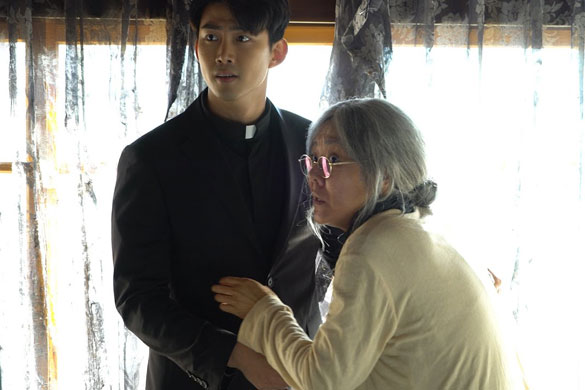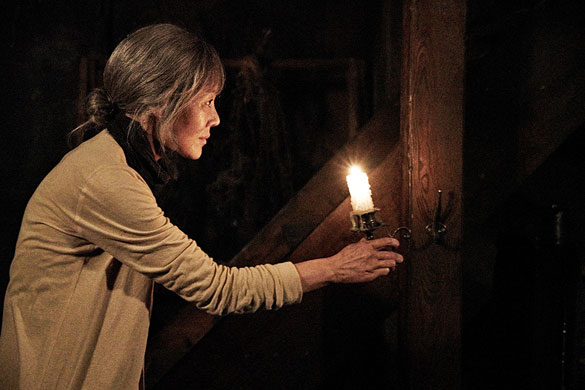
 |
||||
In 1992, wife and mother Mi-hee (Kim Yun-jin) is convicted of killing her entire family and sentenced to 30 years of incarceration. However, though the body of her husband was found in the basement of the family home with a fatal stab wound, her son's corpse was never discovered; police naturally assuming that she disposed of it elsewhere in an interrupted attempt to cover her tracks. Step forward 25 years to the present day and Mi-hee – now an old woman suffering from terminal throat cancer – is finally allowed to leave prison to serve the final five years of her sentence under house arrest in the very home the murder(s) took place.
Review: House of the Disappeared opens in classic (Korean and indeed other) horror form: On a deeply gloomy night, torrential rain pours down on and around Mi-hee’s family home; lightning providing an intermittent eerie glow to surroundings while rolls of thunder crack the silence. Inside, Mi-hee regains consciousness to find herself lying on the floor of an upstairs room and on checking her reflection in a largely smashed wall mirror discovers blood streaming down her face from a wound on the side of her head. While attempting to steady herself, Mi-hee hears cries for help coming from her son downstairs and (almost instinctively) grabbing a nearby knife she tentatively begins to make her way towards the basement... Virtually anyone watching the above opening scene of House of the Disappeared, the segment's conclusion – deliberately not detailed here – and indeed the majority of the film's running time will be wholly familiar with a narrative tone, story elements and genre tropes seen in an absolute myriad of horror films from anywhere in the world you care to mention and from almost any time frame; even those viewers with only a passing interest in scary movies: From the use of oppressive weather; to gloomy, spooky corridors only lit sporadically by lightning cracks; to (later) long-haired, pale-faced female ghosts; shadowy figures rattling and banging locked doors; and grabbing-hand jump scare after screaming spectre jump scare - they're all here. Heavens, there's even an old, seemingly psychic female character repeatedly warning of the house's dark aura and the almost de rigueur of late inclusion of a frenetic shaman ritual.However, while such a statement on my part would in most instances be a criticism, that really isn't the case here. House of the Disappeared’s narrative feels largely classic from the very outset and, as such, these included elements and tropes fit wholly naturally into proceedings rather than appearing as hackneyed and, all the more importantly, they work: The atmosphere in the house is perfectly, oppressively brooding; Mi-hee's fear and/or paranoia is wholly palpable; the horror elements – be they ‘jump scares' or more naturally evolving yet wholly twisted story events – are genuinely chilling within a thoroughly engaging narrative; and director Lim Dae-woong on more than one occasion adds understated humour to the darker story aspects (what befalls the deeply pretentious feng shui practitioner brought to the house to rid it of spirits springs immediately to mind) to ensure that House of the Disappeared is horrifically enjoyable from start to finish and ultimately well worth investing in, for horror fans and Korean film obsessives alike.
Director Lim Dae-woong also on more than one occasion tweaks these familiar genre ideas to ensure that even moments that are fairly easily predictable still come across as having a freshness to them, at least to an extent. Case in point: Jump or ‘Boo!’ scares tend to be hugely hit or miss affairs and in any less than masterful hands they can pretty much be seen coming from a mile away. Lim Dae-woong repeatedly stretches the ‘calm before the storm’ moments so that even though you know the jump scare is coming – and Lim Dae-woong knows you know it's coming – you have to wait... and wait... to the extent that I for one found myself almost aching for it to arrive (anticipation building to the nth degree, in the process) and as such when it does eventually invariably appear, a palpable feeling of relief comes along with the heart jump making what could have been an almost throwaway, overused device far more horrifically enjoyable, if you will. The classic feel of House of the Disappeared is added to yet further by the casting of Kim Yun-jin in the leading role. While in her lengthy career she has starred in films and TV shows of numerous genres (dramas such as Harmony, Ode to my Father and even US TV show Lost, etc), back in the days of the New Korean Cinema wave of the late 90s and early 2000s she was largely known for her roles in hard-hitting thrillers and horrors (Shiri, Diary of June, Seven Days) and while she wasn't quite the NKC ‘Scream Queen’ that Yum Jung-ah (A Tale of Two Sisters, Tell Me Something, The Mimic), for example, was and is, Kim Yun-jin’s casting in House of the Disappeared nonetheless feels like she's come back to one of a number of genres that have sorely missed her.At the end of the day, all of the above ensures that House of the Disappeared could sit as easily and comfortably alongside classic horrors of the New Korean Cinema wave as stand as Korean horror of the 21st century, feeling wholly and completely Korean through and through in spite of being based on The House at the End of Time – a 2013 Venezuelan horror film directed by Alejandro Hidalgo.
House of the Disappeared consists of two timelines running in parallel; Mi-hee’s present day story juxtaposed with past events leading to her arrest for murder, shown in flashback. This flashback narrative device, too, can be seen in an almost endless number of Korean films from over and through the years but while it could easily be said that flashback storylines have been and indeed still are massively overused in Korean cinema, director Lim Dae-woong ultimately provides a narrative explanation for why its use is not only wholly necessary but also absolutely vital for the story to succeed as a whole. So much so, in fact, that the film frankly wouldn't work without the use of those very flashbacks. So, what of House of the Disappeared’s narrative focus itself?
HOUSE OF THE DISAPPEARED (시간위의집 / 2017)
|
||||
All images © Little Big Pictures Review © Paul Quinn |
||||



